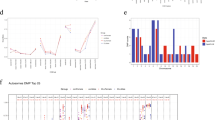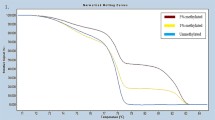Abstract
Background
X chromosome aberrations are involved in carcinogenesis and are associated with gender differences in cancer development. Abnormal DNA methylation also contributes to cancer. Carbohydrate Sulfotransferase 7 (CHST7), encoded by the X chromosome, is abnormally expressed during tumor development. However, its impact on colorectal cancer (CRC) and the effect of CHST7 methylation on sex-specific CRC risk remain unclear.
Aims
To investigate the effect of CHST7 methylation in white blood cells on CRC risk and to evaluate its impact on gender-specific differences.
Methods
CHST7 methylation in white blood cells was determined using methylation-sensitive high-resolution melting. A propensity score analysis was performed to control potential confounders. Furthermore, extensive sensitivity analyses were applied to assess the robustness of our findings. In addition, we validated the initial findings with a GEO dataset (GSE51032).
Results
CHST7 hypermethylation in white blood cells was associated with an increased CRC risk [odds ratio (OR)adj = 4.447, 95% confidence interval (CI) 2.662–7.430; p < 0.001]. The association was validated with the GEO dataset (ORadj = 2.802, 95% CI 1.235–6.360; p = 0.014). In particular, CHST7 hypermethylation significantly increased the CRC risk in females (ORadj = 7.704, 95% CI 4.222–14.058; p < 0.001) and younger patients (≤ 60 years) (ORadj = 5.755, 95% CI 2.540–13.038; p < 0.001). Subgroup analyses by tumor location and Duke’s stage also observed these associations.
Conclusion
CHST7 methylation in white blood cells is positively associated with CRC risk, especially in females, and may potentially serve as a blood-based predictive biomarker for CRC risk.




Similar content being viewed by others
References
Siegel RL, Miller KD, Jemal A. Cancer statistics, 2018. CA Cancer J Clin. 2018;68:7–30.
Zheng ZX, Zheng RS, Zhang SW, Chen WQ. Colorectal cancer incidence and mortality in China, 2010. Asian Pac J Cancer Prev. 2014;15:8455–8460.
Worthley DL, Whitehall VL, Spring KJ, Leggett BA. Colorectal carcinogenesis: road maps to cancer. World J Gastroenterol. 2007;13:3784–3791.
Jones PA, Baylin SB. The epigenomics of cancer. Cell. 2007;128:683–692.
Robertson KD. DNA methylation and human disease. Nat Rev Genet. 2005;6:597–610.
Ashktorab H, Brim H. DNA Methylation and Colorectal Cancer. Curr Colorectal Cancer Rep. 2014;10:425–430.
Bardhan K, Liu K. Epigenetics and colorectal cancer pathogenesis. Cancers (Basel). 2013;5:676–713.
Terry MB, Delgado-Cruzata L, Vin-Raviv N, Wu HC, Santella RM. DNA methylation in white blood cells: association with risk factors in epidemiologic studies. Epigenetics. 2011;6:828–837.
Marsit C, Christensen B. Blood-derived DNA methylation markers of cancer risk. Adv Exp Med Biol. 2013;754:233–252.
Li L, Choi JY, Lee KM, et al. DNA methylation in peripheral blood: a potential biomarker for cancer molecular epidemiology. J Epidemiol. 2012;22:384–394.
Shivapurkar N, Gazdar AF. DNA methylation based biomarkers in non-invasive cancer screening. Curr Mol Med. 2010;10:123–132.
Walters RJ, Williamson EJ, English DR, et al. Association between hypermethylation of DNA repetitive elements in white blood cell DNA and early-onset colorectal cancer. Epigenetics. 2013;8:748–755.
Ally M, Al-Ghnaniem R, Pufulete M. The relationship between gene-specific DNA methylation in leukocytes and normal colorectal mucosa in subjects with and without colorectal tumors. Cancer Epidemiol Biomark Prev. 2009;18:922–928.
De Angelis P, Clausen O, Schjølberg A, Stokke T. Chromosomal gains and losses in primary colorectal carcinomas detected by CGH and their associations with tumour DNA ploidy, genotypes and phenotypes. Br J Cancer. 1999;80:526–535.
Ali R, Marafie M, Bitar M, et al. Gender-associated genomic differences in colorectal cancer: clinical insight from feminization of male cancer cells. Int J Mol Sci. 2014;15:17344–17365.
Ross MT, Grafham DV, Coffey AJ, et al. The DNA sequence of the human X chromosome. Nature. 2005;434:325–337.
Uchimura K, Fasakhany F, Kadomatsu K, et al. Diversity of N-acetylglucosamine-6-O-sulfotransferases: molecular cloning of a novel enzyme with different distribution and specificities. Biochem Biophys Res Commun. 2000;274:291–296.
Stowell SR, Ju T, Cummings RD. Protein glycosylation in cancer. Annu Rev Pathol. 2015;10:473–510.
Debeljak Z, Dundovic S, Badovinac S, et al. Serum carbohydrate sulfotransferase 7 in lung cancer and non-malignant pulmonary inflammations. Clin Chem Lab Med. 2018;56:1328–1335.
Cordero F, Ferrero G, Polidoro S, et al. Differentially methylated microRNAs in prediagnostic samples of subjects who developed breast cancer in the European Prospective Investigation into Nutrition and Cancer (EPIC-Italy) cohort. Carcinogenesis. 2015;36:1144–1153.
Shu XO, Yang G, ** F, et al. Validity and reproducibility of the food frequency questionnaire used in the Shanghai Women’s Health Study. Eur J Clin Nutr. 2004;58:17–23.
Austin PC. Balance diagnostics for comparing the distribution of baseline covariates between treatment groups in propensity-score matched samples. Stat Med. 2009;28:3083–3107.
Elze MC, Gregson J, Baber U, et al. Comparison of propensity score methods and covariate adjustment: evaluation in 4 cardiovascular studies. J Am Coll Cardiol. 2017;69:345–357.
Greenland S. Quantitative methods in the review of epidemiologic literature. Epidemiol Rev. 1987;9:1–30.
VanderWeele TJ, Ding P. Sensitivity analysis in observational research: introducing the E-value. Ann Intern Med. 2017;167:268–274.
Bingham S, Riboli E. Diet and cancer—the European prospective investigation into cancer and nutrition. Nat Rev Cancer. 2004;4:206.
Riboli E, Hunt KJ, Slimani N, et al. European prospective investigation into cancer and nutrition (EPIC): study populations and data collection. Public Health Nutr. 2002;5:1113–1124.
Sanchez-Palencia A, Gomez-Morales M, Gomez-Capilla JA, et al. Gene expression profiling reveals novel biomarkers in nonsmall cell lung cancer. Int J Cancer. 2011;129:355–364.
Oliveira-Ferrer L, Hessling A, Trillsch F, Mahner S, Milde-Langosch K. Prognostic impact of chondroitin-4-sulfotransferase CHST11 in ovarian cancer. Tumour Biol. 2015;36:9023–9030.
Rosenbaum PR, Rubin DB. The central role of the propensity score in observational studies for causal effects. Biometrika. 1983;70:41–55.
Lyon MF. Gene action in the X-chromosome of the mouse (Mus musculus L.). Nature.. 1961;190:372–373.
Dunford A, Weinstock DM, Savova V, et al. Tumor-suppressor genes that escape from X-inactivation contribute to cancer sex bias. Nat Genet. 2017;49:10–16.
Jones MJ, Goodman SJ, Kobor MS. DNA methylation and healthy human aging. Aging Cell. 2015;14:924–932.
Lonning PE, Berge EO, Bjornslett M, et al. White blood cell BRCA1 promoter methylation status and ovarian cancer risk. Ann Intern Med. 2018;168:326–334.
Heiss JA, Brenner H. Impact of confounding by leukocyte composition on associations of leukocyte DNA methylation with common risk factors. Epigenomics. 2017;9:659–668.
Teschendorff AE, Menon U, Gentry-Maharaj A, et al. An epigenetic signature in peripheral blood predicts active ovarian cancer. PLoS ONE. 2009;4:e8274.
Acknowledgments
This work was supported by the National Natural Science Foundation of China grants, Grant numbers 81473055 and 30972539.
Author information
Authors and Affiliations
Corresponding author
Ethics declarations
Conflict of interest
The authors declare that they have no conflict of interest.
Ethical approval
All procedures performed in studies involving human participants were in accordance with the ethical standards of the Institutional Research Board of Harbin Medical University and with the 1964 Declaration of Helsinki and its later amendments or comparable ethical standards.
Informed consent
Informed consent was obtained from all individual participants included in this study.
Additional information
Publisher's Note
Springer Nature remains neutral with regard to jurisdictional claims in published maps and institutional affiliations.
Electronic supplementary material
Below is the link to the electronic supplementary material.
Rights and permissions
About this article
Cite this article
Bi, H., Liu, Y., Pu, R. et al. CHST7 Gene Methylation and Sex-Specific Effects on Colorectal Cancer Risk. Dig Dis Sci 64, 2158–2166 (2019). https://doi.org/10.1007/s10620-019-05530-9
Received:
Accepted:
Published:
Issue Date:
DOI: https://doi.org/10.1007/s10620-019-05530-9




